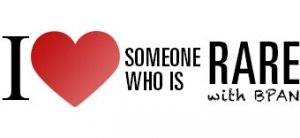BPAN
Results of the calls
On 29th November 2019, the Collaborative Research Project (SFB) 1177 “Molecular and Functional Characterisation of Selective Autophagy“, funded by the German Research Foundation (DFG), was extended for another four years. The research programme is endowed with more than 12 million EUR. Within the subproject E03 “Molecular functions of WDR45/WlPI4 in ferritinophagy and neurodegeneration” under the direction of Prof. Dr. Tassula Proikas-Cezanne, the WIPI4 protein and its role for BPAN will be investigated in more detail.
As in every year, the “Million Dollar Bike Ride” charity cycling race organized by the University of Pennsylvania (USA) in 2019 raised funds for BPAN research. The NBIA Disorders Association scholarship of US$61,245 goes to Prof. Paul Lockhart of the Murdoch Children’s Research Institute in Victoria, Australia.
The renewed call for proposals for the submission of a research project by AISNAF, NBIA DA and Hoffnungsbaum from March 2019 was successful. After a pre-selection of the research applications by experts, the panel of patient representatives approved on 25 July 2019 the BPAN project
Mechanistic insights into iron accumulation in WDR45 mutant
neurons linked to β-propeller-associated neurodegeneration
by Dr. Lena Burbulla of Northwestern University in Chicago, USA. The project is endowed with € 65,000 and has a duration of 18 months.
This funding includes a large part of the donations raised for Milly’s Mission. We would like to thank all donors very much.
Dr. Burbulla will investigate the connection between the symptoms of BPAN and the disordered iron balance in the brain cells. She wants to test a new interesting hypothesis, as there is rather not too much iron in the cells damaging the brain. Instead, she assumes that the iron trapped in waste products is not released by the defective autophagy process and is therefore not available to the cells as an important substance to function properly. It is therefore more a lack of bioavailable iron than an excess of harmful iron.
Unfortunately, the call for proposals issued by AISNAF, NBIA DA and Hoffnungsbaum in July 2018 failed to identify any research programmes worthy of funding for BPAN. Therefore, the funds provided will be put out to tender again in spring 2019.
In October 2018, two scholarships of US$ 150,000 and US$ 45,000 were awarded. They will go to Dr. Young-Ah Seo of the University of Michigan and Dr. Mario Mauthe of the University of Groningen. Further information can be found here.
On 19 December 2018, the Italian NBIA organisation AISNAF published the results of a research fellowship’s grant regarding three types of NBIA being supported by Hoffnungsbaum e.V. and the NBIA DA. These fellowships are financed by donations. The donations collected by us will enter the research on BPAN as well.
The choice of eligible projects was made during a two-stage process: Firstly, the proposals were evaluated regarding their scientific merit by international experts. However, the final decision was reserved to a lay panel consisting of people concerned and representatives of patients from different countries, amongst others Milly’s father. This was to make sure that the supported projects contribute as quickly as possible to the implementation of a therapy.
The only chosen project to be supported with 40,000€ for one year was a pilot study that aims at determining the basis for the development of gene therapy against PKAN. PKAN is the NBIA type known longest and most extensively researched on. There is a realistic chance of success. Additionally, it is to be expected that the study’s results can be applied to other types of NBIA like BPAN, too.
Unfortunately, no project for the research on BPAN could be financed this time. The means available for this purpose will be used for a new call at the beginning of 2019. We will keep you informed.
